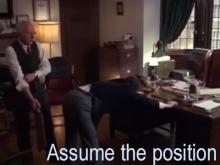
A lawyer welcomes the client feedback
In-house lawyers want firms to move away from time-based billing and towards fixed fees, according to results so far in the RollOnFriday In-house Lawyer Survey.
"Move away from time billing model. It is outdated," said a GC in Private Equity. "Even if the client facing fee arrangement is not time based, internal evaluations at law firms are based on time spent which has bad knock on effects for clients.”
Another respondent agreed:“people talk about value billing but they always benchmark against time on the clock - a sort of reverse engineering." They added "I am wholly uninterested in how long things take, only how useful they are."
Respondents also wanted lawyers to provide accurate and prompt quotes. "Get your quotes right," said a senior in-house lawyer in financial services. "Stop hourly billing and start quoting for work as a project!"
A GC in the aviation sector said that upon asking a certain Magic Circle firm for a quote "on a fairly routine matter, they didn't come back for two weeks, and when they did were surprised we had gone elsewhere."
Many in-house lawyers felt that they were being overcharged. One respondent objected to a "penny-pinching" firm charging for time recorded by a "junior lawyer reviewing work by a trainee". The respondent said they "shouldn't be charged full-rate for a firm training and monitoring staff" as "that cost should be discounted by the firm."
Other lawyers felt that technology should help lawyers cut fees. A GC in a bank said “Electronic execution of documents is inevitable and necessary. It'll save time and costs."
Are you an in-house lawyer? Then please, take RollOnFriday's poll for in-house lawyers:













Comments
70
46
"I am wholly uninterested in how long things take, only how useful they are."
This is the sort of thing I hear often from clients who haven't the foggiest idea what is and is not useful, and always insist on strategies that they've been told repeatedly are doomed to failure but then somehow conclude that it's your fault when it goes tits up in precisely the manner you told them it would.
64
46
Ah, the classic "we don't want time based billing, unless the work takes a short time in which case we do" attitude of clients.
Obviously the subtext behind this is the belief that clients will overall be charged less in fixed fee arrangements. I've had experience of a couple of cases where we did agree fixed fees, and because we had lots of existing knowhow/precedents we came in very much under that fixed fee. Of course, the clients were outraged upon viewing our narratives (thanks ebilling) that we had "won" in that fixed fee deal. Conversely, I've never seen a client outraged when a fixed fee results in us writing off a bunch of time...
I would be all for fixed fees, but only if clients accepted that that also entails lawyers charging far more than the time spent in some cases as otherwise it doesn't make sense for law firms if there is no give and take.
66
43
Clients don't want a fixed fee. They want a guaranteed maximum price model.
They are very interested in your timesheets and narratives when they've agreed a fixed fee with you but think you didn't spend that much time on the job. They suddenly lose interest in your timesheets when you've agreed a fixed fee but then they recast the scope entirely halfway through, you end up spending twice as much time and your costs increase, but they don't want to accept they moved the goalposts and cough up the additional money.
If you want a fixed fee, I'll give you one but don't you dare ask me for timesheets.
70
36
I take it some of these quotes came from those who failed in private practice, rather than those who were actually intelligent and chose to move in-house. As someone who is also senior in-house and has reviewed many invoices:
- Billing remains the most effective way for law firms to assess work done. The nature of the work, and the number of unexpected issues that arise, make fixed fee not suitable for major cases or transactions. Confined advice / projects yes, major M&A no.
- Much extra time on the clock is caused by the business itself requesting extras that we don’t need or making clownish errors in the information we supply to the law firm. None of that is free.
- If we request something that takes a long time, we will need to pay. Preparing detailed annexes for a submission is a boring, time-consuming task that is not “useful” - we are paying for it to be correct and to win a case. Likewise with document review. We obviously don’t want to see the partner preparing annexes, but the fact the trainee had to spend x hours on it is reasonable.
- Multiple layers of review exist so that the partner does not have to charge us 5 hours at partner rates for doing a piece of research. The trainee can do the legwork, even if it takes them 10 hours, as their charge-out is a fraction of the partners and a lot of their time gets written off. However any in-house lawyer with half a brain will then want a qualified solicitor to review and amend that work and add to it, before the partner takes a final look. None of that is free.
In any event, you always review the invoice and negotiate the reasonable fee. When we have used upfront fixed fees before, often the work, even by top law firms, is pretty shoddy given a lack of incentive once they’ve hit the fixed fee under the internal measure of hours billed.
62
51
Give us all the same work but charge us less, say in-house lawyers.
Unless it would have cost us less if you charged in the way that we used to moan about, they hastily add.
Also, I want a fixed fee for a project at the outset irrespective of the fact that nobody has a clue how long it will take, what amount of work will need to be done, or even what it consists of at this early stage, report GC's.
... and what 'value add' services will you throw in for free intones the procurement drone in the silences that fall between the sounds of chisels tapping away at invoices.
Bears shit in the woods declares the Pope, a Catholic.
All are amazed.
48
44
I believe that a fixed fee model where time spent on the matter has no relevance for the invoice is better for everyone involved.
55
48
"Get your quotes right," said a senior in-house lawyer in financial services. "Stop hourly billing and start quoting for work as a project!"
Sure, but get your instructions right (as in make at least a half-assed attempt to clearly explain what you need and listen to what we say when we try to explain what that will involve). And don't suddenly expand the scope of work after you realise you messed something up while still expecting the same fee arrangements.
54
54
- "Yes, my fixed fee for your proposed commercial litigation is £750,000 to the end of trial, to include counsel's fees and all other disbursements. I'll need it all paid up-front, thanks. "
- "That's way too much. I want to know how you calculated it and I am only prepared to pay for work done as we go along."
Perhaps the process would be easier if clients also didn't constantly lie and "misremember" what documents they had in their possession and control, and what they'd done and said to the other side.
65
43
Problem with fixed fees is that the client will get you running around doing all sorts of tasks that should not be part of the scope of work or that they should be doing themselves and will have no respect at all for your time and need to run a profitable business. I have seen it so many times.
53
48
“people talk about value billing but they always benchmark against time on the clock - a sort of reverse engineering." They added "I am wholly uninterested in how long things take, only how useful they are."
More resource = more cost is not an unusual or unique concept. All for alternative client-facing arrangements but the idea of ignoring the resource cost makes no sense. If you don't want it enough to pay what it costs, do without it - again, not a unique concept!
48
66
Whatever happened to the client is always right. Reading some of these comments from pp lawyers you’d think they were the only lawyer on the planet who can do the clients work.
62
40
Time based billing is completely stupid and is effectively law firm management smashing themselves in the face with a hammer.
You hear time and time again that they can't estimate a deal, it's utter bollocks. They have at least 30 years of raw digitised data that they can crunch on multiple versions of ever deal imaginable that will give them the numbers on what they need to charge to make their money.
It's just lazy old fooks who can't comprehend that the world has moved on clinging to the past and firms have enough of that as it is without this. Clients hate time spent billing, lawyers hate time spent billing it's a complete no brainer.
70
50
Weird how the in-house lawyers who want to move away from time-based billing are also happy to insist on seeing, and quibble over, every individual time entry.
57
41
@Anonymous 17 September 21 10:44
The problem is that clients are often wrong, or at least not focusing on the right aspect - and it's the duty of a good PP lawyer to tell them that.
If a client wants to press ahead regardless then thats fine, but they should be willing to pay for all the work that will involve.
60
43
@sumoking 10:49:
Problem is, that all the experience won't help you if at the beginning of the project nobody really knows what it will entail.
It starts as the "quick straight-forward sharedeal with limited scope red flag dd" - and client expects a rather modest quote. Then the parties start changing the deal structure, it turns out that certain financing instruments need to be settled - together with vested claims of (ex) employees from overcomplex VSOPs etc. etc.
59
41
@Anonymous 17 September 21 10:44. The client isn't always right. If the response you want from your external solicitors is "you're right, every time" then you're a blithering idiot who is going to come badly unstuck. Perhaps you should be instructing Mr Lohn.
69
40
@Sumoking. Estimate, sure; we can absolutely do that for you, based on the information provided at the outset by you. An estimate is not a fixed fee, and the information that clients provide at the outset frequently is wrong or subject to change.
You castigate us for clinging to the past and then suggest that our billing should be based upon the past, and not upon the intricacies of each matter. Perhaps you should dial back the insults a little bit.
52
46
@private practice lawyers 17 September 21 10:51
Why is this weird? If they are worried about inflated time then they would want to look at each time entry.
58
62
A GC in the aviation sector said that "I know our industry has failed to meet any deadline when we produce new aircraft and always overrun our budgets by huge amounts and our products still tend to have major safety issues, but I cannot believe the same thing happens in ..."
56
42
@ New Malcolm: so it's a fixed fee that can be unpicked because of "inflated time"?
64
53
As someone who's been at quite a senior level on each side of the fence, perhaps clear scope, which doesn't shift and caps (which, lets be honest are, fixed fees) are the way forward. Plus volume for the law firms who can then rely on coming out whole over a run of deals.
That would require law firms to discuss fees as they go and in-house lawyers not to hide from reality.
62
50
The answer here is not fee caps, or fixed fees or guaranteed maximums. The answer is for law firms to grow a bit of backbone and tell jumped up in-house lawyers to get back in their box a bit more often.
I don't walk into my local pub and demand to pay for my drinks with chocolate buttons. I don't expect my local garage to limit its fee to £40 regardless of whether my car requires an oil change or a new engine. I don't ask my cleaner to clean my house and then tell her afterwards that actually I'd like to pay in monthly instalments.
What external lawyers do is inherently unpredictable. If in-house lawyers can't accept that their solution is to not instruct externally, rather than trying to turn their problem into their lawyers' problem.
68
55
Time for new firms to set up with fixed legal fees. Competition is a good thing for clients.
75
47
Anon @ 13:08 - they exist and the work they do is resi conveyancing
52
39
It can work for small, discrete and/or run of the mill bits of work. Because the work required is predictable. You’ll find that fixed fee arrangements for work like that already exist.
It does not work for complex M&A or disputes.
69
64
Lol at the bitter PP comments on anyone inhouse as a "failed lawyer". It doesn't matter if they were indeed failed lawyers, they're your client now.
78
46
Any ostensibly fixed fee is always so heavily caveated as to be worthless. "This was unexpected, that was unforeseeable." Too bad! You pitch your fee so that the risk is accounted for.
70
48
@3-ducks
If you’re finding that ANY ostensibly fixed fee for legal services is caveated to the extent that it’s worthless, then maybe that ought to tell you something about the nature of the work you’re procuring. That is, that most of the high value stuff is extremely difficult to estimate with accuracy at the outset.
As to the ‘worthless’ part, the value of the pitch isn’t just “how much will I pay” in absolute terms. It’s “which firm is best value” (relative to each other) and “who can offer good service”. Or at least it should be.
60
47
Perhaps 3Ducks should be more proficient at giving clear workscopes (including proposed and realistic timelines). It’s not rocket science but it does require intelligence and the ability to act as more than a glorified road sign between the decision makers within an organization and external counsel.
51
55
In house sounds great. I don't know why those nasty PP lawyers are so rude. Don't they know that we are the clients, and therefore we are very, very important! All of the following are untrue:
Range of work. In-house teams usually cover a limited sub-set of tasks, passing everything complex to external counsel.
Career development. Legal teams are cost centres, to be run at the minimum cost. There is, therefore, virtually no investment in lawyers, for training or otherwise.
Salaries. Exponentially lower than private practice.
Pay increases. Often non-existent: you are seen as an unfortunate but unavoidable support cost, so the business wants to pay you as little as possible (and does).
Promotion. Frequently non-existent: you are reliant on a more senior lawyers above you (in a highly immobile organisation) moving on.
Access to support and resources. Usually limited: no professional support lawyers/knowledge lawyers, limited subscriptions to legal databases and other online resources, and almost certainly nothing as luxurious as a legal library. You will frequently be reliant on your panel firms' lawyers for up-to-date information (which may make you feel like a second-class lawyer, and just a tad status-conscious).
Training. Rarely any training. Unlike in private practice where with experience your charge-out rates increase, in house you are a cost centre, and investing in you makes no sense.
Employability. Moving from private practice to in-house is almost invariably a one-way move, specifically a step down.
Credibility. In-house lawyers (male and female) can be regarded by many in private practice as (1) having taken the ‘Mommy track’ opting out of their career in favour of child-rearing; and (2) being those who couldn’t, or wouldn’t, ‘hack it’ in private practice.
Office quality. Open plan offices, co-located with other staff, i.e. commercial teams, secretarial pools, etc. Can be very noisy, and many people are forced to wear noise-isolating headphones to be able to work. It doesn't really matter though, as you just send all your complex work to PP lawyers...
Summary. In-house lawyers cost money, private practice lawyers make money. Everything else flows from that...
56
41
The usual one-way blatherings from clients who want slick work, done at the drop of a hat, for a "relationship building" fee. Here's how it should go - Good, Fast or Cheap - pick any two. Hey ROF, as interesting as it may be to get these insights and pearls of wisdom from in-house, why not conduct a reverse poll to uncover what private practice lawyers consider our learned in-house friends and clients could improve upon? Just a thought.
60
46
Are there any other 'innovations' a group of people whose interests are diametrically opposed to those of private practice would, purely for their own benefit, like private practice lawyers to adopt? Pop 'em in the suggestion box if so, the recycling truck comes round at five.
58
56
I object to paying for training. Partners should pay for this out of their drawings, not the client.
55
40
Sometimes the billable hour is ditched too freely. When I was a trainee at Freshfields, a Big 4 Insolvency Specialist asked for advice on a point. They were quoted £5k. I opened a book and found the answer in 30 minutes, another hour of my time preparing a short email and 30 minutes discussing with the partner. Moral of the story: always ask for fee caps!
As a favour, the partner said ‘we won’t charge for any of tue copying or printing’.
A different time.
65
42
I've been reading guff about the death of the billable hour for twenty years. Still nothing changes. The only thing that has changed is insurers and companies make 25% arbitrary cuts to all bills submitted. Then you have to appeal them, which is a huge time suck etc... It's an absurd waste of time.